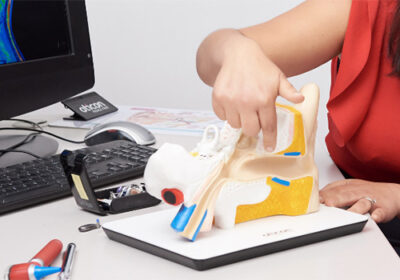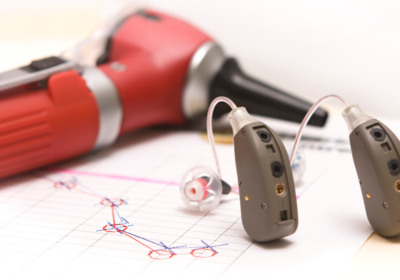Hearing loss is defined as the complete or partial inability to hear sounds in one or both of the ears. It may occur as a gradual process and leads to a deterioration in the capacity to hear sounds clearly. In fact, an individual may initially not even notice the decline in the ability to hear or follow conversations. There are also people who may be aware but reluctant to seek help. However, hearing loss has a range of consequences and immensely impacts the quality of life. It negatively affects the manner in which an individual interacts with family or friends and performs in the workplace. Our capability to communicate with other people defines us and enables us to lead a healthy life. Hearing is valuable and this makes it necessary to address the issue to improve the overall quality of life.
How do we hear:
 The ability to detect sound waves is a complex process and involves the following steps. After sound waves are collected, they travel through the auditory canal and hit the eardrum. The sound waves cause a change in air pressure and this leads to the vibration of the eardrum. The vibrations pass to the ossicles in the middle ear which are picked up by hair-like cells in the cochlea. As soon as the vibrations hit them, the hair cells move and transfer the movement data to the brain. The processed data is interpreted by an individual as sound.
The ability to detect sound waves is a complex process and involves the following steps. After sound waves are collected, they travel through the auditory canal and hit the eardrum. The sound waves cause a change in air pressure and this leads to the vibration of the eardrum. The vibrations pass to the ossicles in the middle ear which are picked up by hair-like cells in the cochlea. As soon as the vibrations hit them, the hair cells move and transfer the movement data to the brain. The processed data is interpreted by an individual as sound.
The basic auditory ability of an individual has a lot of significance. As one of the primary senses, it is the power to hear that enables people to hear, recognize sounds and communicate. This influences the capacity of a person to carry out daily tasks efficiently. If not detected and treated on time, hearing loss can change the way in which a person interacts with others and carries out daily activities.
In this context, it is vital to remember that hearing loss is just not an ailment of old age. In fact, it can strike people of all ages and is caused by a number of factors including age. Moreover, hearing loss can be of different levels ranging from a reduced ability to hear sounds to the inability to detect sounds at all.
The Impact of Untreated Hearing Loss:
The implication of hearing loss differs from individual to individual but people with hearing impairment may experience negative psychological, social and physical impacts.
The psychological implications may include the feeling of embarrassment and problems focusing on work to depression and a lower self-esteem. The social consequences vary from feelings of isolation and inability to communicate clearly. The physical impact includes stress and headache. People with untreated hearing loss may also report experiencing the following problems.
Depression and negativity:
 The emotional well-being of an individual is influenced by a number of factors including the hearing ability. Hearing impairment impacts verbal communication and can make a person feel lonely and sad.
The emotional well-being of an individual is influenced by a number of factors including the hearing ability. Hearing impairment impacts verbal communication and can make a person feel lonely and sad.
Diminished psychological health:
The feeling of anxiety resulting from an individual’s isolation from social groups has an impact on the overall health. People with untreated hearing loss may find themselves anxious and worried in social situations when they are unable to follow conversations. The fear of rejection by others and embarrassment often leads to stress.
Paranoia:
Hearing impairment often leads people to misinterpret a conversation or ask other people to repeat. This often causes emotional distress as individuals may sense anger being directed towards them without a reason.
A decline in social activity:
For older people, social isolation is a concern and has a devastating impact. The reduced ability to hear results in losing social contacts. People find it difficult to actively participate in social activities and develop the tendency to withdraw from social situations.
Emotional stress:
 There is a high probability of people suffering from an untreated hearing loss to experience feelings of insecurity and irritability. This is especially true for people with severe hearing loss. Such people may also find it difficult to learn new tasks and have a lower self-esteem.
There is a high probability of people suffering from an untreated hearing loss to experience feelings of insecurity and irritability. This is especially true for people with severe hearing loss. Such people may also find it difficult to learn new tasks and have a lower self-esteem.
This clearly indicates that it is essential for an individual to seek treatment at the outset of the problem to ensure that a hearing loss is dealt with effectively.
Hearing Loss and the Australian Population:
As people age, progressive hearing loss is inevitable. It is a fact of life and research suggests that one in every six Australian is impacted by hearing impairment. The inability to hear clearly is projected to increase by 2050.
However, with advancement and modern interventions, it is possible to improve the quality of life with hearing aids. The availability of small and discreet hearing aids has made it possible to significantly reduce the negative impacts of a hearing loss. Hearing aids can make a huge difference and dramatically improve the ability of an individual to hear.
In case you find it difficult to follow conversations and are feeling disconnected from people around, you are not alone. We understand your needs and are here to help you with the best possible hearing solutions. At Active Audiology, our qualified hearing professionals will be happy to assist you. We are home to the widest range of hearing aids and can suggest a solution that best addresses your hearing concern, suits your lifestyle and is specifically programmed to your needs. If you wish to know more about our hearing aids, feel free to reach out to our team. You can call us on 1300 364 007. We will be glad to help you.



